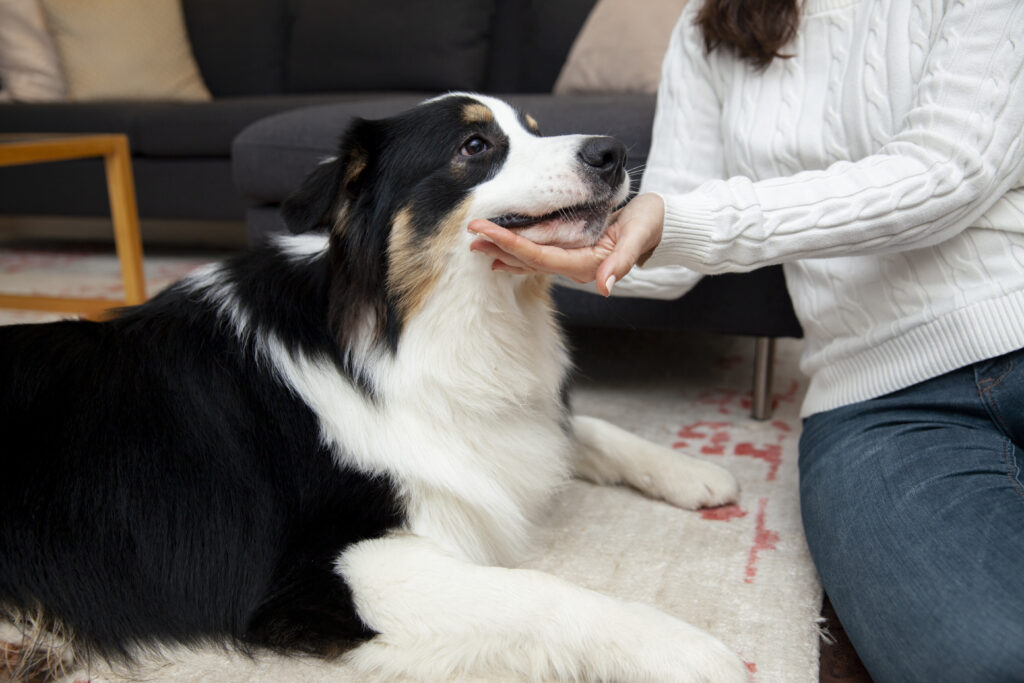
If you’re a dog owner, you’ve probably experienced the frustration of seeing your furry friend digging in the carpet. This behavior can be puzzling, and it often leaves us wondering why our dogs are doing it and how we can get them to stop. In this article, we’ll explore the reasons why do dogs dig in the carpet, what it means, and most importantly, what you can do to address this behavior. We’ll break it down into simple, easy-to-understand explanations that everyone can follow.
Also Read: What is Displacement Behavior in Dogs? Understanding Those Quirky Actions
Understanding the Instincts Behind Digging
Before we can address the behavior, it’s important to understand that digging is a natural instinct for dogs. In the wild, dogs dig for several reasons, such as creating a comfortable spot to rest, hiding food, or even making a cool area to lie down in during hot weather. While your dog might not need to dig for these reasons indoors, these instincts are still very much a part of who they are.
-
Seeking Comfort
One of the most common reasons dogs dig in the carpet is that they are trying to create a comfortable spot to rest. Just like humans fluff up their pillows or adjust their blankets before going to bed, dogs might dig in the carpet to make a soft, cozy spot for themselves.
- How to Identify It: If your dog digs in the carpet before lying down, especially in areas where they frequently sleep, it’s likely they’re just trying to get comfortable.
- What You Can Do: Ensure your dog has a comfortable bed in a quiet, cozy spot. You might also want to provide blankets or soft bedding that they can adjust to their liking.
For more information on how to create a comfortable sleeping environment for your dog, visit The Humane Society’s guide to dog beds.
-
Boredom and Pent-Up Energy
Dogs are energetic animals, and if they don’t get enough physical and mental stimulation, they may start engaging in destructive behaviors like digging in the carpet. This is often a sign that your dog is bored or has too much energy that they need to burn off.
- How to Identify It: If your dog digs in the carpet frequently throughout the day or seems restless, they may be trying to entertain themselves or release excess energy.
- What You Can Do: Make sure your dog gets plenty of exercise and mental stimulation. Regular walks, playtime, and interactive toys can help keep your dog engaged and reduce the likelihood of them digging in the carpet out of boredom.
For ideas on how to keep your dog entertained, check out this article from the American Kennel Club.
-
Anxiety and Stress
Just like humans, dogs can experience anxiety and stress. When they do, they may engage in behaviors like digging to help relieve their feelings. Digging can be a self-soothing activity that helps them feel more secure, especially if they are left alone for long periods.
- How to Identify It: If your dog digs in the carpet when you’re not home, during thunderstorms, or in other stressful situations, it could be a sign of anxiety.
- What You Can Do: Addressing your dog’s anxiety is important for their overall well-being. Try to identify the source of their stress and provide comfort, whether it’s through calming products, training, or spending more time with them. In severe cases, you may want to consult with a veterinarian or a professional dog trainer.
For tips on managing your dog’s anxiety, visit ASPCA’s guide to calming an anxious dog.
-
Attention-Seeking Behavior
Dogs are social animals that crave attention from their owners. If your dog learns that digging in the carpet gets a reaction from you, whether it’s positive or negative, they may continue to do it as a way to get your attention.
- How to Identify It: If your dog digs in the carpet when you’re around and seems to look at you for a reaction, they might be doing it to get your attention.
- What You Can Do: Make sure you’re giving your dog plenty of positive attention throughout the day. Reward good behavior with treats, praise, and playtime, and try to avoid reacting to the digging behavior. Instead, redirect your dog’s attention to a more appropriate activity, such as playing with a toy.
For more information on managing attention-seeking behavior, check out this article from the American Veterinary Medical Association.
-
Instinct to Hide Valuables
Some dogs have a natural instinct to bury or hide their food, toys, or other valuable items. This behavior is a leftover from their wild ancestors who needed to hide food to keep it safe from other animals.
- How to Identify It: If your dog digs in the carpet and then places a toy or treat in the spot they’ve dug, they may be trying to hide it.
- What You Can Do: Provide your dog with a designated area where they can hide their toys, such as a sandbox or a special digging area outside. This way, they can satisfy their instinct without damaging your carpet.
For more tips on providing appropriate outlets for your dog’s digging instincts, visit The Spruce Pets’ guide to stopping destructive digging.
How to Stop Your Dog from Digging in the Carpet
Now that we’ve explored the reasons why dogs dig in the carpet, let’s discuss some strategies to help stop this behavior. Remember, the key is to address the underlying cause and provide your dog with appropriate alternatives.
Also Read: What to Know as a First Time Dog Owner? A Comprehensive Guide
-
Increase Exercise and Mental Stimulation
As mentioned earlier, boredom and excess energy can lead to destructive behaviors like digging. Ensuring your dog gets enough physical exercise and mental stimulation is crucial in preventing this behavior.
- Daily Walks: Regular walks are essential for your dog’s physical and mental well-being. Try to walk your dog at least once or twice a day, depending on their energy level.
- Interactive Toys: Puzzle toys, treat-dispensing toys, and interactive games can help keep your dog mentally engaged and reduce the likelihood of them digging in the carpet.
For more ideas on exercising your dog, check out this guide from PetMD.
-
Provide a Comfortable Resting Area
If your dog is digging to create a comfortable spot, make sure they have a cozy bed or blanket where they can rest. You can also try placing their bed in a quiet, out-of-the-way area where they feel safe and secure.
- High-Quality Dog Bed: Invest in a comfortable, supportive dog bed that meets your dog’s needs. Consider orthopedic beds for older dogs or those with joint issues.
- Blankets and Bedding: Provide soft blankets or bedding that your dog can arrange to their liking.
For recommendations on the best dog beds, visit this article from Good Housekeeping.
-
Address Anxiety and Stress
If your dog’s digging is related to anxiety or stress, it’s important to address the root cause. This might involve making changes to your dog’s environment, providing calming aids, or seeking professional help.
- Calming Products: There are several products available, such as calming collars, sprays, or supplements, that can help reduce your dog’s anxiety.
- Behavioral Training: In some cases, working with a professional dog trainer or behaviorist can help address anxiety-related behaviors.
For more information on calming products, visit this guide from The Dodo.
-
Redirect Attention
If your dog is digging for attention, it’s important to redirect their behavior to something more appropriate. When you see your dog starting to dig, calmly redirect their attention to a toy or engage them in a game. Make sure to reward them with praise or treats when they stop digging and focus on the alternative activity.
- Interactive Play: Engage your dog in a game of fetch, tug-of-war, or another activity they enjoy.
- Training Commands: Teach your dog commands like “leave it” or “no dig” to help manage their behavior.
For more training tips, check out this article from the American Kennel Club.
-
Create a Designated Digging Area
If your dog has a strong instinct to dig, providing them with a designated area where they can dig freely might help. This could be a sandbox in the yard or a specific spot outside where digging is allowed.
- Sandbox for Digging: Fill a sandbox with sand or soft dirt and encourage your dog to dig there by hiding toys or treats in the sand.
- Outdoor Digging Area: If you have a yard, designate a specific area where your dog is allowed to dig. You can train them to dig only in this area by rewarding them when they do.
For more on how to create a digging area, visit this guide from The Spruce Pets.
When to Seek Professional Help
While many digging behaviors can be managed with the strategies we’ve discussed, there are times when it may be necessary to seek professional help. If your dog’s digging is excessive or accompanied by other troubling behaviors, it’s a good idea to consult with a veterinarian or a professional dog trainer. Here are some signs that professional help may be needed:
- Persistent Anxiety: If your dog’s digging is linked to severe anxiety or stress, and home remedies aren’t helping, a veterinarian can help you explore options such as behavioral therapy or medication.
- Destructive Behavior: If your dog’s digging is causing significant damage to your home, it may indicate a deeper behavioral issue that needs to be addressed by a professional.
- Compulsive Digging: In some cases, digging can become a compulsive behavior, where your dog seems unable to stop despite your efforts. A professional dog trainer or behaviorist can work with you to develop a plan to manage and reduce this behavior.
For more information on when to seek help, visit this guide from the American Society for the Prevention of Cruelty to Animals (ASPCA).
Preventing Digging Behavior from Developing
Prevention is always better than cure, and there are steps you can take to prevent digging behavior from developing in the first place. Here are some tips:
- Early Socialization: Socializing your dog from a young age can help prevent anxiety-related behaviors, including digging. Expose your dog to different environments, people, and other animals to build their confidence.
- Consistent Routine: Dogs thrive on routine. Establishing a consistent schedule for feeding, walking, and playtime can help reduce stress and prevent destructive behaviors.
- Positive Reinforcement: Reward your dog for good behavior with treats, praise, and playtime. Positive reinforcement helps your dog understand what is expected of them and encourages them to repeat desirable behaviors.
- Proper Training: Start training your dog as early as possible. Basic commands like “sit,” “stay,” and “leave it” can be helpful in managing unwanted behaviors, including digging.
For more tips on preventing behavior problems, visit this article from the American Veterinary Medical Association (AVMA).
Final Thoughts
Digging in the carpet can be a frustrating behavior for dog owners, but it’s important to remember that it’s often a natural instinct or a response to boredom, anxiety, or other underlying issues. By understanding the reasons behind the behavior and addressing those causes, you can help your dog feel more comfortable and reduce or eliminate the digging.
Provide plenty of physical and mental stimulation, ensure your dog has a comfortable resting area, and consider creating a designated digging spot if needed. If the behavior persists or is linked to anxiety, don’t hesitate to seek professional help from a veterinarian or dog trainer.
With patience, consistency, and a positive approach, you can help your dog overcome the urge to dig in the carpet and enjoy a happier, healthier life.
For more resources on dog behavior and training, visit ASPCA’s dog care section or American Kennel Club’s dog training articles.
Frequently Asked Questions (FAQs)
- Is digging in the carpet a sign of a health problem?
Digging in the carpet is usually a behavioral issue rather than a sign of a health problem. However, if your dog’s behavior changes suddenly or is accompanied by other signs of distress, such as excessive licking, panting, or changes in appetite, it’s a good idea to consult your veterinarian to rule out any underlying health issues.
- Can certain dog breeds be more prone to digging?
Yes, some dog breeds are naturally more inclined to dig due to their instincts and breed characteristics. For example, terriers, dachshunds, and beagles are known for their digging behavior, as these breeds were historically used for hunting animals that burrow underground. If you have a breed that is prone to digging, providing an appropriate outlet for this behavior is essential.
- How can I stop my puppy from digging in the carpet?
Puppies are naturally curious and may dig in the carpet as they explore their environment. To stop this behavior, provide plenty of toys and activities to keep your puppy occupied. Begin training your puppy early with positive reinforcement techniques, and create a comfortable sleeping area for them. Be patient and consistent with your training, and redirect any digging behavior to an appropriate activity.
- Is digging in the carpet dangerous for my dog?
Digging in the carpet is generally not dangerous, but it can lead to accidental ingestion of carpet fibers, which could cause digestive issues. Additionally, if your dog is digging in an attempt to reach something hidden in the carpet, such as small objects or food, they could potentially ingest something harmful. Monitoring your dog’s behavior and addressing the root cause of the digging is important to ensure their safety.
- Can training alone stop my dog from digging in the carpet?
Training is an important part of stopping your dog from digging in the carpet, but it may not be enough on its own. Addressing the underlying cause of the behavior—whether it’s boredom, anxiety, or seeking comfort—is crucial. Combining training with environmental enrichment, exercise, and appropriate outlets for digging will be more effective in stopping the behavior.
- Should I punish my dog for digging in the carpet?
Punishing your dog for digging in the carpet is not recommended, as it can lead to fear, anxiety, and mistrust. Instead, focus on positive reinforcement by rewarding your dog for good behavior. Redirect their attention to an appropriate activity, such as playing with a toy, and make sure they are getting enough exercise and mental stimulation.
- What are some safe alternatives to carpet for my dog to dig in?
If your dog has a strong instinct to dig, providing a safe alternative can help satisfy this behavior. Consider setting up a sandbox in your yard where your dog can dig freely. You can also use a designated area in your garden or provide digging toys that are designed to mimic the digging experience. These alternatives can help redirect your dog’s digging behavior away from your carpet.
- How long does it take to stop a dog from digging in the carpet?
The time it takes to stop a dog from digging in the carpet varies depending on the dog and the cause of the behavior. With consistent training and addressing the root cause, many dogs can learn to stop digging within a few weeks to a couple of months. Patience and persistence are key, and it’s important to reinforce positive behavior while discouraging digging.
- Can professional training help with digging behavior?
Yes, professional training can be very effective in addressing digging behavior, especially if the behavior is severe or if you’re struggling to manage it on your own. A professional dog trainer or behaviorist can assess the situation, provide guidance, and create a tailored training plan to help stop the digging.
- Are there any products that can help stop my dog from digging in the carpet?
There are products available that may help deter your dog from digging in the carpet. Bitter sprays, which have an unpleasant taste, can be applied to areas where your dog likes to dig. However, it’s important to use these products as part of a broader strategy that includes training and addressing the root cause of the behavior. Always follow the manufacturer’s instructions and ensure that any product you use is safe for your dog and home.

